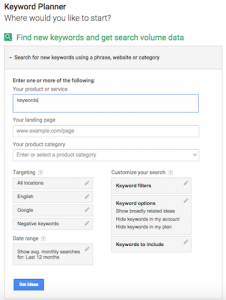A SEO audit is a comprehensive website analysis which helps you determine the performance of your on-page and off-page SEO tactics. For example, you can perform a SEO audit to find out that you’re lacking qualified and relevant backlinks or missing meta descriptions on your blog pages.
Here are three major reasons why every company should perform a SEO audit:
1. It’s insightful
A SEO audit helps you determine the effectiveness of you and your competitors’ SEO activities. A SEO audit contains the following analysis:
- Backlink Competitive Analysis: This analysis helps you evaluate and compare the quality of your backlinks with your competitors. To do so, you can use tools such as Google Webmaster Tools or Open Site Explorer to find out which sites are linking to you or your competitor’s website.
- Poisonous Link Analysis: This analysis helps you determine whether you’re attracting poisonous links. Poisonous links are links from bad neighborhoods such as spammy directories or link farms. If you discover that you’re receiving poisonous links, you can disavow them by taking the following steps:
a) Go to Google Webmaster Tools.
b) Go to the Dashboard, click Search Traffic, and then click Links to Your Site.
c) Under Who Links the Most, click More.
d) Click on Download more sample links to generate all of your inbound links.
e) Add each poisonous link you want to disavow in a text file line by line.
f) Go to the disavow links tool page.
g) Click Disavow links.
h) Click Choose file.
- Content Keywords Analysis: This analysis helps you determine how Google interprets your website based on the content written on your site. To perform a Content Keywords Analysis, access your Google Webmaster Tools account, click on Google Index, and then click on Content Keywords.
Once you’ve done so, you will see which keywords Google associates your website with. For example, you may discover that Google thinks your eCommerce site is related to keywords such as “Nike shoes” or “runners” when your e-tail website in fact sells eyewear. In this case, you would change how Google perceives your website by adding more targeted keywords such as “sunglasses” or “eyewear” in your web content.
- Site Speed Analysis: This analysis helps you assess the speed of your website and discover ways to improve it.
To perform a Site Speed Analysis, enter your website URL in Google’s PageSpeed Insights and Google will make suggestions on how you can increase your website speed.
- Social Sharing Button Analysis: This analysis helps you determine whether you’ve added social media sharing icons on your website.
To include social media sharing buttons on your site, install plug-ins such as AddThis or ShareThis.
- Duplicate Content Analysis: This analysis helps you determine whether there’s more than one version of a webpage indexed by Google.
Duplicate Content occurs because one or more of the following three reasons:
– URL Parameters. When multiple sources direct to the same page, duplicate content happens. For example, the following three URLS could all lead to the same webpage.
• http://www.example.com/1
• http://www.example.com/page2?source=referral
• http://www.example.com/page3?campaignid=4876
– Printer-friendly pages. A webpage may have a printer-friendly version of the page, creating two versions of the same page.
• http://www.example.com/2
• http://www.example.com/printer/2
– Session IDs. Some sites use Session IDs to track their visitors’ previous activities. The IDs may get appended in the URL and create multiple versions of the webpage. Below is an example:
• http://www.example.com/page2
• http://www.example.com/page2?sessionid=456789
Javascript Test Analysis: This analysis helps you assess whether content on your website still appears when Javascript is disabled.
According to Google’s Webmaster Central Blog, “some JavaScript removes content from the page rather than adding, which prevents us from indexing the content.” This suggests that if you have content in Javascript, there’s a chance that Google won’t be able to index it. Therefore, SEO experts suggest that content or major keywords should be written in HTML so Google can for sure crawl them.
To perform a Javascript Test Analysis, disable Javascript on your browser and see whether your major keywords or content still appears.
• Content Audit Analysis: This analysis helps you determine whether you’ve included unique and relevant meta descriptions, meta keywords, SEO-friendly URLs, title tags, and other attributes on your website.
These analyses help you unravel issues that undermine marketing performance and find ways to correct or mitigate those issues.
2) It’s time-efficient
A SEO audit is fast to perform. You can conduct a comprehensive SEO audit and discover issues with your SEO tactics within a few hours by outsourcing to a SEO expert or following the tips above.
3) It’s structured
A SEO audit contains eight major analyses that SEO experts should follow. This structure or framework ensures that you go through each component of SEO properly so you aren’t undermining in any area. This framework helps you create and implement a comprehensive SEO strategy that will increase your website’s search ranking.
A SEO audit is a crucial component of a company’s integrated digital marketing program because generally speaking, a majority of a company’s visitors come from organic traffic. By performing a SEO audit routinely, you will determine whether you’re following SEO best practices and generating optimal results. If you discover that you aren’t following SEO best practices and producing optimal performance, you can make changes such as ones mentioned above.
(417)







